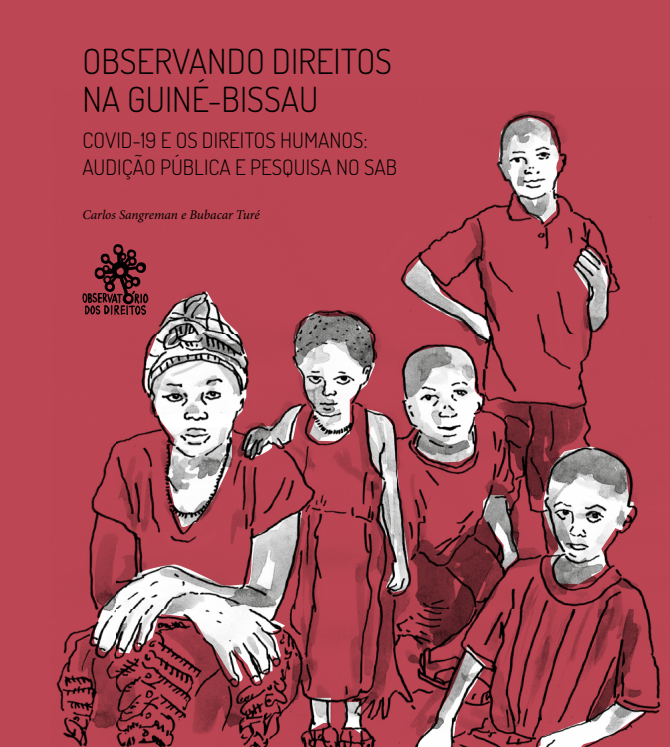Observando direitos na Guiné-Bissau: Covid-19 e os direitos humanos: audição pública e pesquisa no SAB

Title: Observando direitos na Guiné-Bissau: Covid-19 e os direitos humanos: audição pública e pesquisa no SAB
Author(s): Sangreman, Carlos; Turé, Bubacar
Publication Date: Mar-2022
Publisher: ACEP com LGDH e CEsA
Quotation: Sangreman, C., Turé, B. (2022). Observando Direitos na Guiné-Bissau - Covid-19 e os Direitos Humanos: audição pública e pesquisa no SAB.pag.93. Lisboa: ACEP, com LGDH e CEsA. ISBN 978-9898625-27-4
Abstract: This research intends to investigate the human rights situation during the Covid-19 pandemic in Guiné-Bissau between January 2020 and January 2022. The framework is based on documentary research on human rights in sub-Saharan Africa from the production of international and specialized organizations, and other non-governmental human rights defenders of the same period. For Guiné-Bissau, in addition to equal research, the communiqués and official bulletins of the “Hight commissariat for Covid-19” were also collected with the information of infected, hospitalized, recovered, deaths and vaccinations, as well as interviews with the newspapers of the Commissioner and the Secretary. With the concentration of cases in the capital, Bissau, the research organize a survey of families, of market sellers and of companies on the effects of the pandemic and the measures enacted by the Government/Presidency to contain. A public hearing was also organized in the House of Rights, with various entities ranging from the High Commissariat to Unions, journalists, and public order police to information about how each institution through its situation and action in this period. As conclusions of the analyses of all these qualitative and quantitative data, it is possible to affirm that Guinea-Bissau's fragility has such a weight in Guinean society that a disease that has killed fewer people in the country than malaria, diarrhea or tuberculosis has not overlapped with problems arising in poverty and low incomes in general. It affected Human Rights by showing that it was already knew about the enormous shortcomings of the health system, but the effects were more graves on economic and social rights by the abrupt stagnation of economic international activity, the cooperation project, unemployment, and the rise of poverty than directly by the pandemic and measures adopted. The human rights of first generation, more political, freedom of the press and demonstration were affected, with arbitrary arrests and violence practiced by unidentified individuals intensifying the climate of impunity and feeling that the regime is becoming increasingly repressive, but it cannot be said that they were effects directly arising from the pandemic.
Identifier: http://hdl.handle.net/10400.5/24820
Category: Working paper
Abstract:
Observando Direitos na Guiné-Bissau – Covid-19 e os Direitos Humanos: audição pública e pesquisa no SAB intends to investigate the human rights situation during the Covid-19 pandemic in Guiné-Bissau between January 2020 and January 2022. The framework is based on documentary research on human rights in sub-Saharan Africa from the production of international and specialized organizations, and other non-governmental human rights defenders of the same period. For Guiné-Bissau, in addition to equal research, the communiqués and official bulletins of the “Hight commissariat for Covid-19” were also collected with the information of infected, hospitalized, recovered, deaths and vaccinations, as well as interviews with the newspapers of the Commissioner and the Secretary. With the concentration of cases in the capital, Bissau, the research organize a survey of families, of market sellers and of companies on the effects of the pandemic and the measures enacted by the Government/Presidency to contain. A public hearing was also organized in the House of Rights, with various entities ranging from the High Commissariat to Unions, journalists, and public order police to information about how each institution through its situation and action in this period. As conclusions of the analyses of all these qualitative and quantitative data, it is possible to affirm that Guinea-Bissau’s fragility has such a weight in Guinean society that a disease that has killed fewer people in the country than malaria, diarrhea or tuberculosis has not overlapped with problems arising in poverty and low incomes in general. It affected Human Rights by showing that it was already knew about the enormous shortcomings of the health system, but the effects were more graves on economic and social rights by the abrupt stagnation of economic international activity, the cooperation project, unemployment, and the rise of poverty than directly by the pandemic and measures adopted. The human rights of first generation, more political, freedom of the press and demonstration were affected, with arbitrary arrests and violence practiced by unidentified individuals intensifying the climate of impunity and feeling that the regime is becoming increasingly repressive, but it cannot be said that they were effects directly arising from the pandemic.
Quotation:
Sangreman, C., Turé, B. (2022). Observando Direitos na Guiné-Bissau – Covid-19 e os Direitos Humanos: audição pública e pesquisa no SAB. pag.93. Lisboa: ACEP, com LGDH e CEsA. ISBN 978-9898625-27-4





